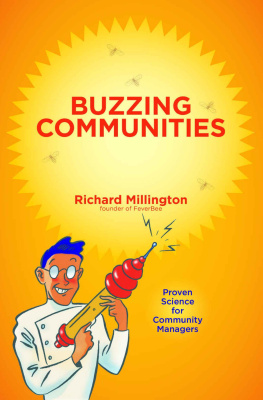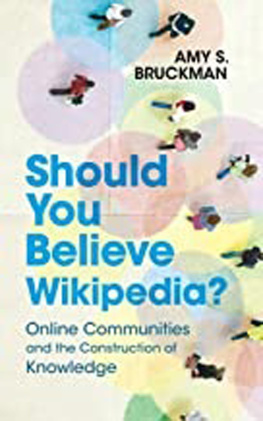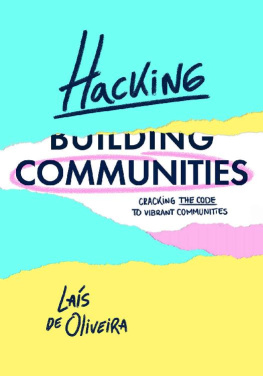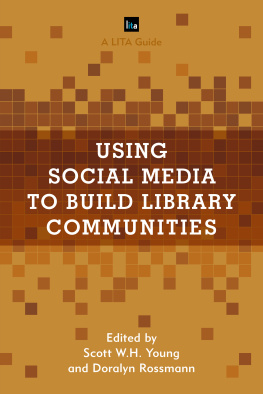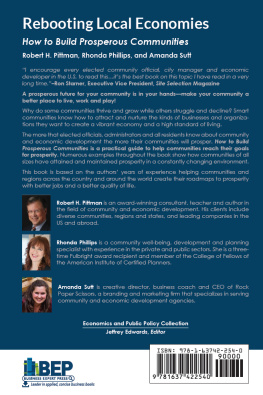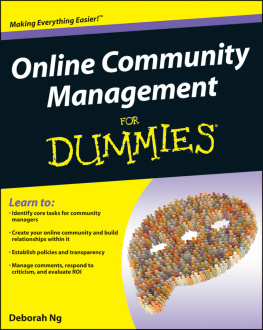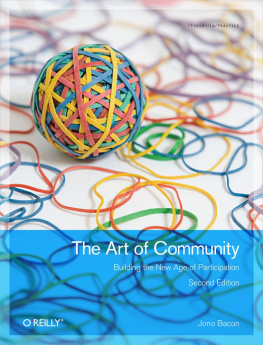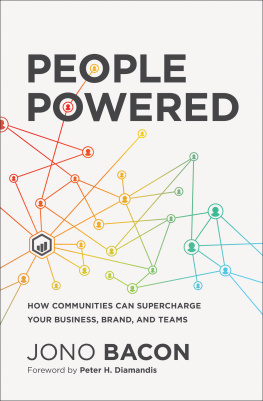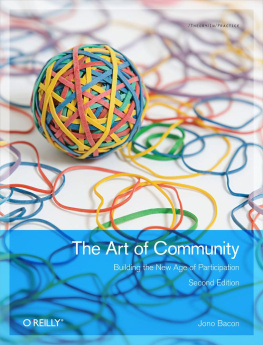BUZZ FOR BUZZING COMMUNITIES
Richard Millington has long been one of my go-tos when I need advice that is actionable, concise andperhaps most importantlyeasily explainable to stakeholders. Buzzing Communities is a fantastic compilation of some of the best of that knowledge. I wish Id had this reference when I started out but even now, after almost a decade of managing communities, I found nuggets of wisdom and a strategic approach to community building that has helped me explain and implement the what, the why and the how more effectively and with fewer hiccups. If you want a road map for building a strong and successful community, this is it.
Justin Isaf, Director of Communities, Huffington Post
Richard Millingtons book is a rocket up the backside of any community manager, however experienced. As you read it, it dawns on you that community management is an evolving field and, for that reason, theres constantly more you could do to enhance your community. Whether its optimising your registration process, tweaking the tone of your emails or illustrating the return on investment of your work, Millington has it covered.
Unlike other community management books, hes not all theory and no trousers; there are practical tips for everything from checking the source code to see what platform a community uses to how to conduct a psychographic interview. All in all, Millington has written a comprehensive and time-saving step-by-step handbook which feels like hes telling you something very valuable while leaving you some room to formulate your own ideas.
Ben Whitelaw, Communities Editor, The Times
All I needed to know about building a community powered with passion and making it bubble with activity. A must read.
Vanessa Von Vanessar, GreenPeace
Yes, you can manage an online community without losing the human touch. This book provides practical ideas to help you understand the health and development of your online community, based on Millingtons repeated experience, not merely anecdotes. It includes guidance on which metrics to track (and which ones not to track), as well as on balancing your management activities, depending on the life cycle stage of the community. Both new and experienced community managers will find helpful advice, whether theyre starting a new community, or taking responsibility for an existing one.
Janet Swisher, Developer, Mozilla
Buzzing Communities
How To Build Bigger, Better, and More Active Online Communities
By Richard Millington

I never thought I would write a book. That I did is a testament to all the people who have helped me throughout the years.
Special thanks to Angie Petkovic and Henry Warren for having a bigger impact on my life and career than they realize.
Further thanks to all the people Ive worked with, especially Matt Cheney, Helen Lynch, and Judi Huck.
Also thanks to continuous sources of inspiration from Seth Godin, Blaise Grimes-Viort, Justin Isaf, Kirsten Wagenaar, Alison Michalk, Venessa Paech, Ramit Sethi, Patrick OKeefe (make sure you read his book too!), Martin Reed, Rachel Happe, Jim Storer, Jono Bacon, Jake McKee, Philip Wride, David McMillan, David Chavis, Cliff Lampe, Brian Butler, Erik Johnston, Sue John, Tamara Littleton, Tia Fisher and everyone else working in community management.
A huge thank you to Robin Dellabough for putting up with me and helping create a book Im proud to have (finally) written.
Finally, a special thank you to my wife, Skirmante Millington... for everything.
Copyright Richard Millington 2012. All rights reserved.
No part of this book may be used or reproduced by any means, graphic, electronic, or mechanical, including photocopying, recording, or by any information storage retrieval system without the written permission of the author except in the case of brief quotations embodied in critical articles and reviews.
ISBN: 978-0-9883599-0-1
Contents
How is your community doing?
This is a simple question.
Your answer will probably be quite short: My community is fine.
You might well be right, so lets ask something a little more specific.
Is your community doing better than last month? Is your community healthier? Are members more engaged? Are members happier? Has the Return On Investment (ROI) of your community increased? Has your community grown? Do members feel a stronger sense of community?
How many of these questions can you answer?
Or, more to the point, how many of your answers could you support with data ? Can you prove that your answers are right?
Now, lets make this a little tougher: how are you doing as a community manager?
Can you prove you have increased the ROI of the community since you joined? Can you prove that youve grown membership, gotten members more engaged, boosted the sense of community? Can you prove youre a valuable asset instead of a wasteful expense?
These basic questions about you and your community will influence what you should work on next, whether your actions the previous month succeeded, whether you should be paid more (or less), and whether you should even have the job.
If you cant answer these questions with supporting data, you need to read this book.
Two amazing things about data
The first amazing thing about data is how much data there is right now. You can collect data on everything from a members thoughts and feelings to how changing the color, font or copy on the platform can improve the registration process.
The second amazing thing is how little data we currently use. In 2009, my company, FeverBee, ran a survey among new clients asking them how they used data. Just fewer than 20% had a clear process for regularly collecting data, only 10% bothered to analyze data, and only one organization had a process for using the results of that analysis to influence future actions.
Thats insane!
Data is the single best asset you have to develop a thriving community. You can use data to optimize every facet of the community management role. You can use data to become far more effective community managers than you are today.
But you need to use it correctly. You need to know what data to collect, how to collect it, how to analyze it, and how to use that data to identify future actions you should take.
Why we need our data
I was fired from my first ever community management job. I was 15 years old and delighted to be doing my dream job: running an online community about video gaming. I worked from home, in my own hours, earning close to a full-time salary. For a 15-year-old, thats not a bad gig.
I followed my job description to the letter. I did everything I had been told to do. I wrote content, responded to members, organized events/activities, resolved conflicts, and even learned how to optimize elements of the platform.
The problem was I had no idea if what I was doing benefited the organization I worked for. It was no big deal; I left the money side to the money men. That was their problem. So long as I followed my job description to the letter, I was fine.
You already know how this ends
One morning I received a courtesy call that my position was being cut. It wasnt that I wasnt doing the job I had been hired for, I just couldnt prove that I had done a good jobnor that doing a good job profited the organization. I hadnt bothered to benchmark the community when I joined. I hadnt bothered to ascertain the metrics of growth, engagement, sense of community, nor ROI.
I didnt realize that my job description was simply a collection of all the things I could be doing. Not all the things I should be doing. As a result, I had been entirely reactive. I reacted to what happened in the community. Nothing I had done had improved the community in the long term.
Next page
